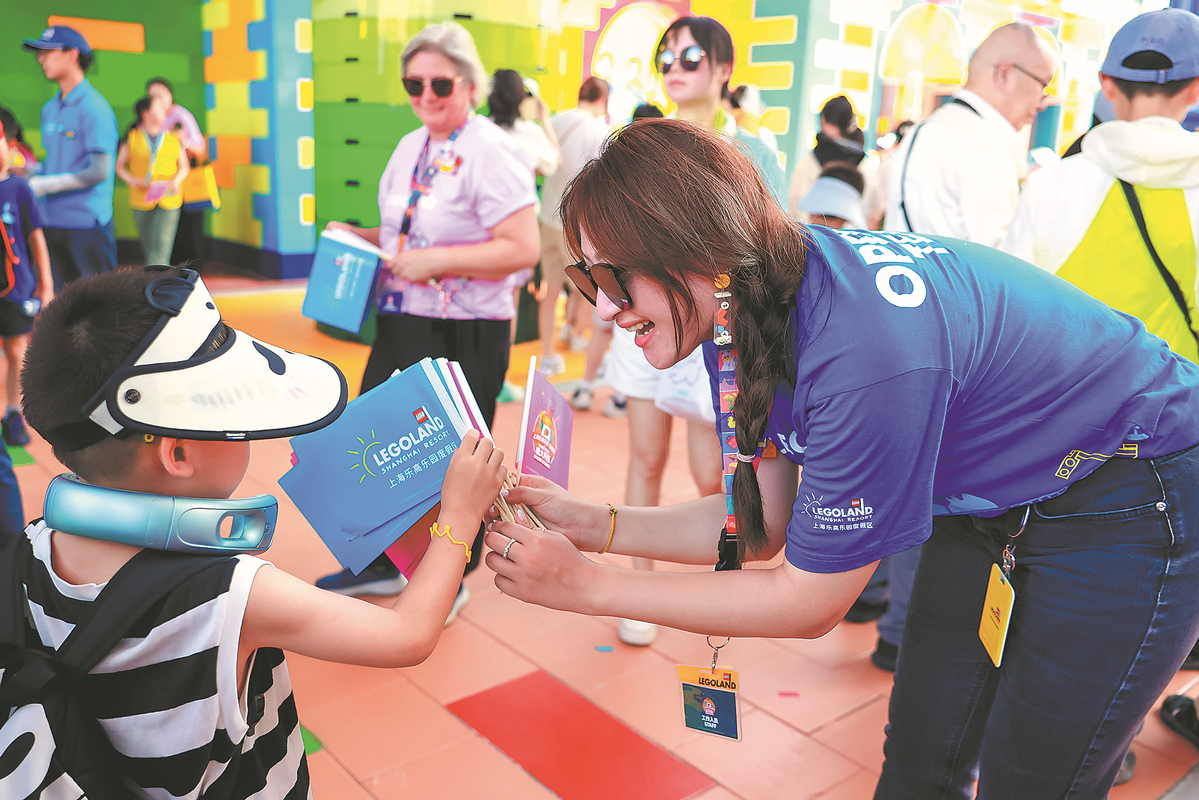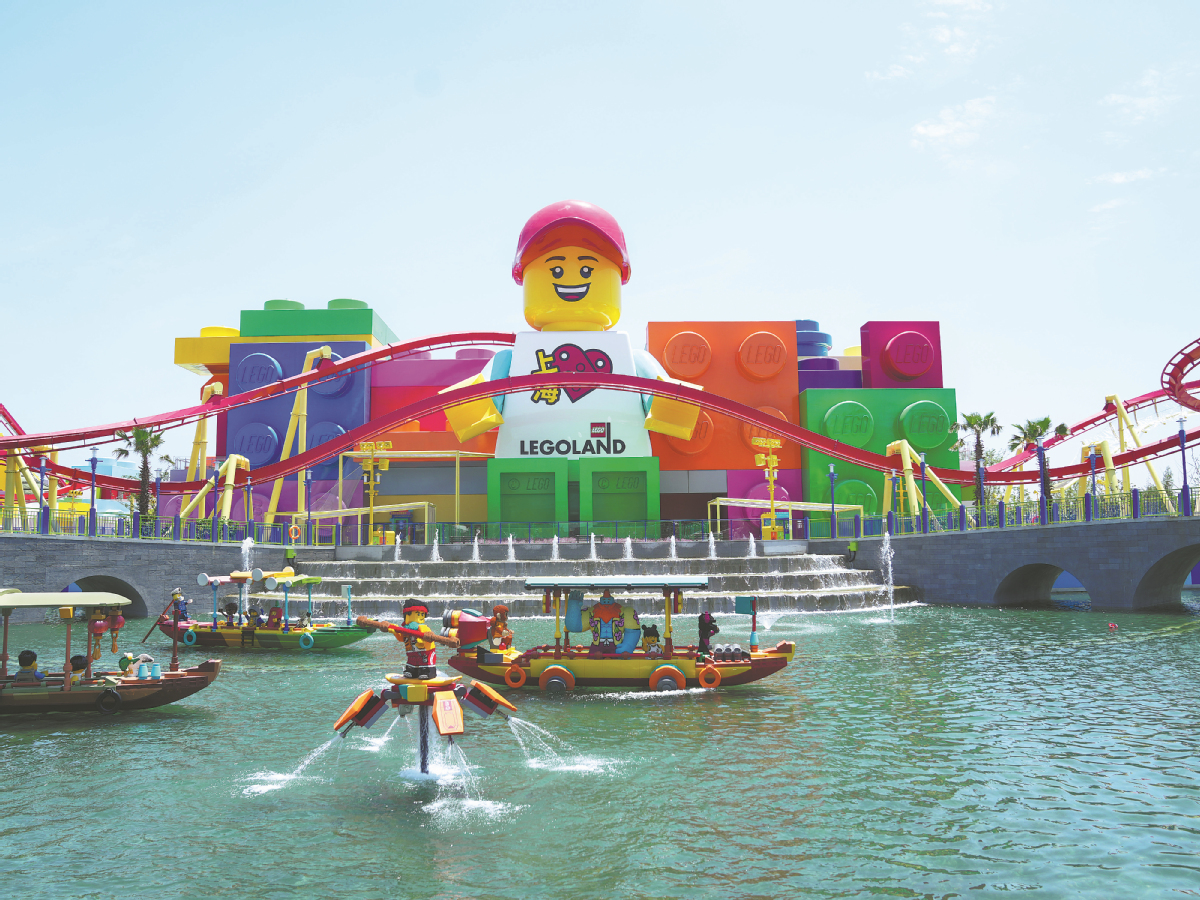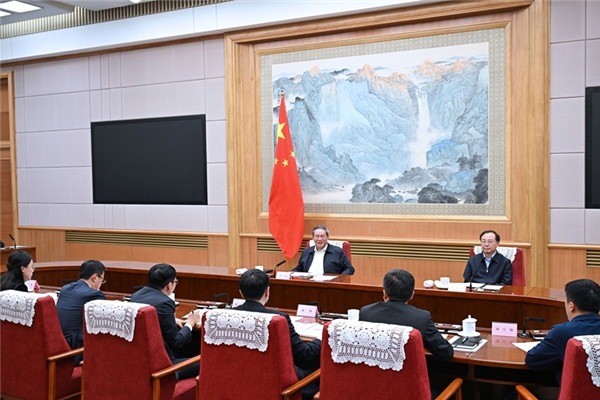Lego doubling down on China market
Opening of Legoland Shanghai Resort marks major milestone in group's efforts to build a full ecosystem — from retail and brand experiences to product innovation and education


The opening of Legoland Shanghai Resort on July 5 has been key to Lego Group's long-term strategy in China, marking a major milestone in its efforts to build a full ecosystem — from retail and brand experiences to product innovation and education.
The move has also showcased the group's strong commitment to its development in China.
The $550 million resort, China's first and the largest Legoland park at the time of opening, is the result of collaboration between Shanghai Jinshan Urban Construction Investment Group, UK-based Merlin Entertainments Group, Denmark's KIRKBI Invest A/S under KIRKBI, the parent company of Lego Group, and Chinese media and entertainment conglomerate CMC Inc.
The 318,000-square-meter resort boasts eight themed lands with more than 75 interactive rides, shows and attractions, as well as thousands of models built using over 85 million Lego bricks.
"It's part of our strategy to have kind of the full ecosystem," said Niels B. Christiansen, president and CEO of Lego Group. "It's important for the brand to create experiences like this."
"Would we like to have more over time? Yes, we would," he added. "But this Legoland Shanghai has been on the way for almost 10 years. It's a big thing — making a park like this. You don't just decide it and build it."
Christiansen believes Legoland brings something distinctive to the entertainment and theme parks landscape in China, which include leading global players Shanghai Disney Resort and Universal Beijing Resort.
"A Legoland resort makes a difference," he said. "We have attractions, and you can go on a roller coaster. But you can also go into mini land, and suddenly you have the Shanghai skyline in amazing size just in front of you."
With around 450 stores and a growing digital presence, the world's leading toy company views China — home to 200 million children — as one of its most strategically important markets.
"Now we are in China with all the different elements of the Lego brand — including building brands, product retail channels and resort," Christiansen said. "An investment like the one in this resort kind of shows our commitment to the Chinese market."
"I have no doubts about the long-term growth prospects of China — both as a global economy and for the Lego Group in China."
The company has returned to growth in the Chinese market in the first half of 2025 after a flat performance last year and is rolling out new initiatives to deepen its reach.
"We've been able to maintain strong growth, which is really a privilege," Christiansen said. "Opening a resort like this and bringing that to consumers — our vision is clearly to grow revenue and the business, but also to grow by reaching more consumers."
To that end, Lego has launched brand events in China ranging from World Play Day to activations around botanical collections and Formula One. "We keep upgrading our stores and making sure that they fulfill what consumers are really looking for," he said.
On its supply chain, while global manufacturers continue to face logistics volatility and tariff concerns, the group has remained resilient — thanks to a regionalized production strategy.
The company manufactures closer to where demand is, both to ensure flexibility and to align with sustainability goals. "Many of the Lego sets that Chinese children will receive this festival season haven't even been produced yet," Christiansen said, "because we can manufacture them just in time, based on which ones are the most attractive sets".
With two factories serving Asia, three in Europe, and one (soon to be two) in the Americas, Christiansen said: "We're not that dependent on tariffs and moving things around the world. In that sense, we've been able to deliver throughout this period."
This system matters for a company with creativity and imagination like Lego. "We need to be both: extremely creative, and extremely precise," he said.
One of the keys to drive the toymaker in continuous growth momentum is its culture of experimentation and synchronized investment across brand, products and channels.
"If you invest in all three things at the same time, you have a much better chance," he said. "It's not enough to invest in products if your channels and brand are not strong."
The global toy market has seen renewed momentum in collectibles — led by players like China's Pop Mart, the maker of Labubu. Pop Mart has over 530 stores worldwide, an amusement park in Beijing, and 46 million shopping members.
According to Clifton Chiu, senior analyst of Euromonitor International, Pop Mart's sustained success has seen it gain about 20 percent market share in the dolls and accessories market in China and 0.5 percent in the world, which is significant considering it is competing in the same space as Barbie. Lego has continued to be the biggest player in the construction toys market for kidults.
In response to the fast rise of the Chinese toymaker, Christiansen said Lego Group is watching the trend with interest but remains focused on long-term brand integrity.
"What we're seeing right now is that Pop Mart and collectibles are growing quite rapidly, but they're not taking away from the building or construction part of it," he said. "It's kind of the Lego Group and collectibles that are growing globally, which is a good thing."
"Our part of the toy market is also growing pretty well. So we are following the trend, but I'm not too concerned that it will eat into our part of the market," he added. "We want to understand what it means to consumers so that we can tap into that experience as well."
Lego already incorporates elements of collectibility in its sets — particularly in display-worthy licensed IP like Formula One — but Christiansen emphasized the company won't chase trends. "We will never compromise on the quality and the learning aspect of what we do," he said. "We don't just do something to do quick business. We want to do something sustainable over time."
The rise of collectibles isn't new. "We're seeing that collectible trend all over the world …trading cards, and a lot of similar things where you buy something blind and get excited about what it is," he said. "It's a category that has historically appeared once in a while, stayed popular for three or four years, then became a little less exciting for a period, and then reemerged in a different setting."
What would be new, he said, is seeing the collectible experience done "the Lego way" — creative, sustainable and built to last.





































